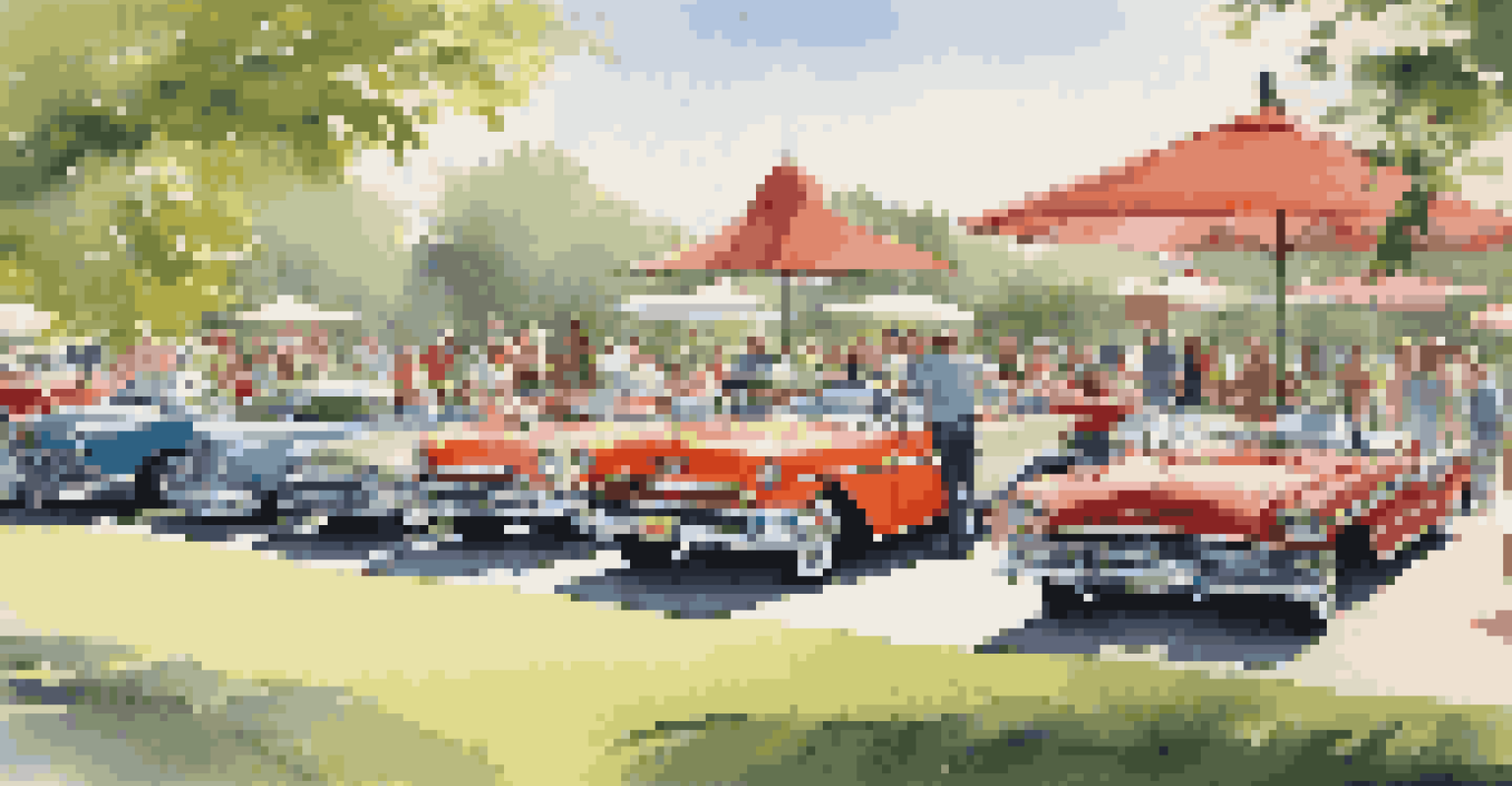Choosing the Right Vintage Car for Your Restoration Project

Understanding Your Passion for Vintage Cars
Before diving into the world of vintage cars, it’s essential to understand your passion. Are you drawn to classic American muscle, elegant European sedans, or quirky Japanese models? Knowing what excites you will guide your search and keep you motivated during the restoration process.
It's not just a car, it's a piece of history.
Passion fuels the restoration journey, making it a rewarding experience. Think about the memories you associate with certain models or the stories behind them. This emotional connection will not only influence your choice but also help you navigate the challenges that come with restoring an older vehicle.
By identifying your passion, you’ll set the foundation for a successful restoration project. This clarity will also help you communicate your vision with fellow enthusiasts, mechanics, or clubs, fostering a sense of community and support along the way.
Setting a Realistic Budget for Your Project
Restoring a vintage car can be a labor of love, but it can also be costly if you’re not careful. Begin by establishing a realistic budget that accounts for purchase price, repairs, parts, and unexpected expenses. It’s wise to overestimate slightly to avoid surprises later on.

Consider the costs associated with sourcing rare parts or hiring skilled labor, as these can quickly add up. Additionally, think about whether you want to do the work yourself or hire professionals for specific tasks. A hands-on approach can save money, but it requires time and skill.
Identify Your Passion for Cars
Understanding what excites you about vintage cars will guide your restoration journey and keep you motivated.
Remember, your budget should reflect not just the car itself, but the journey of bringing it back to life. With a well-planned budget, you can enjoy the restoration process without the stress of financial strain.
Researching Car Models and Their Availability
Once you have your passion and budget in mind, it's time to research different car models. Look into their history, common issues, and parts availability. Each model has its quirks, and understanding these will help you make an informed choice.
The journey of a thousand miles begins with one step.
Visit online forums, read reviews, and connect with vintage car communities. These resources can provide valuable insights into what to expect from different models and where to find them. You’ll also discover tips from those who’ve walked the same path.
As you gather information, create a shortlist of cars that meet your criteria. This list will serve as your roadmap, guiding your search for the perfect vintage car to restore and ensuring you choose a model that fits your vision.
Evaluating the Condition of Potential Cars
When you start visiting potential cars, knowing how to evaluate their condition is crucial. Look for rust, frame damage, and the state of the engine and transmission. A thorough inspection can save you from costly surprises down the road.
Consider bringing along a knowledgeable friend or hiring a mechanic to help assess the car's condition. They can offer insights that you might overlook, such as hidden issues or necessary repairs. This extra set of eyes can be invaluable.
Set a Realistic Restoration Budget
Establishing a budget that includes all potential costs helps prevent financial surprises during the restoration process.
Remember, a car that appears to be in great shape on the outside may hide significant problems underneath. Taking the time to evaluate potential cars carefully ensures you make a sound investment in your restoration project.
Understanding the Restoration Process
Restoration isn't just about fixing up a car; it's a meticulous process that often requires patience and dedication. Familiarize yourself with the stages of restoration, which typically include disassembly, repair, repainting, and reassembly. Understanding these steps will help you plan your timeline and resources effectively.
Each stage presents its own challenges and rewards. For instance, disassembly can be daunting but offers the chance to learn about the car's inner workings. Meanwhile, repainting can transform your car, making all the effort worthwhile as you see it come together.
Approaching the restoration process with an open mind and a willingness to learn will make the journey enjoyable. Embrace the challenges as part of the experience, and you'll find satisfaction in every completed stage.
Building a Network of Support and Resources
Embarking on a restoration project can sometimes feel isolating, but building a network of support can make a world of difference. Connect with local car clubs, online forums, and social media groups dedicated to vintage cars. These communities provide not only advice but also camaraderie.
Sharing your journey with others who share your passion can offer encouragement during tough times. You might find a mentor who can guide you through complex repairs or discover fellow enthusiasts who share tips on sourcing parts.
Build a Supportive Community
Connecting with vintage car enthusiasts can provide valuable advice, encouragement, and camaraderie throughout your restoration project.
Having a support system can enhance your restoration experience, making it more enjoyable and less overwhelming. Remember, you're not alone in this journey; there are many who have faced the same challenges and can help you along the way.
Planning for Future Maintenance and Care
Once your vintage car is restored, the journey doesn’t end there. Planning for ongoing maintenance and care is essential to keep your car in top shape for years to come. Create a maintenance schedule that includes regular checks and services, just as you would for any modern vehicle.
Consider the specific maintenance needs of your vintage car based on its make and model. Some parts may require special attention or specific types of fluids. Staying informed will help you maintain the car's performance and extend its life.

By planning for future care, you can ensure that your hard work pays off. A well-maintained vintage car can provide joy and satisfaction, not to mention a potential investment that appreciates over time.